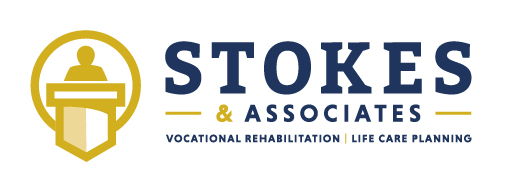Quantifying Work Capacities in Neurocognitive Cases
Consulting with the treating/consultative specialist, such as a neuropsychologist, neurologist, or PM&R physician, helps determine what limitations exist as a result of the specific injury or illness. Psychological and neuropsychological evaluations, if performed, can play a part in delineating an individual’s abilities/limitations. It may not be enough, however, to ask the physician, “what are the limitations of this individual?” but rather, what are the levels of impairment, if any, on various cognitive/mental ability areas of functioning?
The specific responses to the following abilities will assist the vocational expert in assessing an individual’s work capacity/vocational outlook.
remember locations and work-like procedures
understand and remember very short and simple instructions
understand and remember detailed instructions
maintain attention and concentration for 2-hour blocks of time
sustain an ordinary routine without special supervision
perform activities within a schedule, maintain regular attendance, and be punctual within customary tolerances
make simple work-related decisions
get along with coworkers or peers without distracting them or exhibiting behavioral extremes
interact appropriately with the general public
accept instruction and respond appropriately to criticism from supervisors
meet deadlines and complete tasks
respond appropriately to changes in the work setting
function independently
We ask physicians to rate their abilities accordingly, such as:
Unlimited or Very Good - ability to function in this area is more than satisfactory, no limitations
Good (mild impairment) - the ability to function is limited but satisfactory, slight limitations
Fair (moderate impairment) - ability to function is seriously limited, moderate limitations
Poor (marked impairment) - unable to function in this area, marked limitations
None (severe impairment) - a significant loss of psychological, physiological, personal/social adjustment, severe limitations
Once specific limitations are outlined, we adjust a person's vocational profile accordingly to reflect the level of functioning including General Educational Development levels (Reasoning, Mathematics, and Language); Specific Vocational Preparation (time required to learn the techniques, acquire the information and develop the facility needed for average performance in a specific job situation); and Temperaments (ability to work in a variety of situations ). Addressing and clarifying the larger scope of a person’s residual cognitive/mental abilities post-injury assists the expert in addressing more comprehensively their vocational outlook and earning potential.
We offer complimentary consultations concerning "hypothetical matters." To strategize with one of our experts at Stokes & Associates, please call David Barrett at 504-454-5009 or email dbarrett@stokesassociates.com.
Larry S. Stokes, Ph.D.
Aaron Wolfson, Ph.D.
Lacy Sapp, Ph.D.
Todd Capielano, M.Ed., LRC, CRC, LPC, CLC
Ashley Lastrapes, MHS, CRC, CCM, CLCP, LPC, LRC
